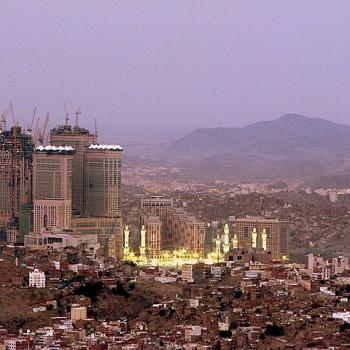
By Zainab Chaudry
This is Day Two of Altmuslim’s #30Days30Writers series for Ramadan 2015.
Ramadan is upon us. We are among the lucky ones who have lived to see it again.
The month of Ramadan is a time for introspection and reflection; an opportunity to refocus and reconnect with our Creator. But, this year, it’s off to a somber start.
As we buckle down with our prayers and ibadah (worship), many of us find ourselves restless and in pain by yet another racially motivated hate crime that is bringing us back to past decades, where such horrors like the Birmingham Church bombing ripped our nation apart. We are standing on that awful precipice once again.
During the first night of Ramadan, around the time of evening prayers on the East Coast, a 21-year-old white man entered the basement of the historic Emanuel African Methodist Episcopal church in Charleston, SC.
After silently observing the bible study group for an hour, he opened fire with a weapon gifted to him a few months ago by his father, and shot and killed nine black people.
Among them was 41-year-old State Senator Rev. Clementa Pinckney – a well-respected and deeply admired pastor and public servant with a long record of service who had successfully rallied support for legislation to curb police misconduct in South Carolina prior to his assassination. Click here to read about the other victims of this hate crime.
Dylann Roof’s alleged motive for this cold-blooded massacre? The same reason given by Buddhist mobs for the genocide and persecution of Rohingya Muslims in Burma: “They are raping our women and taking over our country.” Later, once he was brought in by the police and charged with nine counts of murder (to which he pleaded guilty), he said he wanted to a race war.
It doesn’t get more obvious than that.
America’s racial wounds from the days of slavery and Jim Crow barely have time to begin to heal before they are ripped open again by racially-charged incidents like this.
The Charleston Police Chief has labeled the massacre a hate crime. As a federal investigation is launched, we know that little else other than a deep, abiding hatred could lead someone to walk into a house of worship — a religious sanctuary — and willfully open fire on people who are praying.
American Muslims know too well what it’s like to be despised by strangers; in recent months, our communities and houses of worship have been subjected to unprecedented levels of Islamophobia and attacks. This Ramadan, as mosques across the nation fill with worshippers, some will skip congregational prayers and stay home out of fear for their safety.
We don’t have to subscribe to the same theological doctrines to empathize with the pain of the AME congregation and Charleston’s black community right now. All we need to draw on is our binding sense of humanity and our own personal experiences.
As we find ourselves again waiting to learn the latest developments, some are wondering how we can turn our focus to worship this Ramadan when daily headlines courtesy of a rapid-fire news cycle pierce our consciousness and galvanize us into action.
The storms afflicting our communities and around the world are multiplying and magnifying. Is it possible to shut out conflicts churning around us and concentrate on strengthening our spiritual connection with God?
In fact, it is during these troubled times that we must make even more of an effort to seek refuge and place our trust in Him. Allah says in the Quran, in Chapter 2, Verse 186: “If my servants ask you about Me, I am near. I answer the call of the caller when he calls on me.”
He wants us turn to Him for guidance, and He assures us that He will respond in His infinite wisdom.
It’s often said that serenity is not freedom from the storm, but rather peace amid the storm. In order for us to truly focus and reflect this Ramadan, the challenge for Muslims during these few short weeks is to discover a serenity amidst these daily storms.
It’s a chance for us to develop our personal character, enhance our perspective, share our blessings and improve our self-control while we capitalize on its reward.
Here is some useful advice that has helped me develop serenity in my ibadat while continuing to work on the very important issues at hand. This helps me to maximize the benefits of this month and take advantage of its blessings, as I hope it will do so for you.
Purify Your Intentions
Intention is the foundation of every action according to Islam. It’s narrated on authority of Umar ibn al-Khattab RA, who said: I heard the Messenger of God say:
“All actions are judged by motives, and each person will be rewarded according to their intention.” (Bukhari & Muslim)
The hadith above indicates that sincere intentions are the benchmark of worship. Purify your intentions daily before every act and prayer, and experience the feeling of khushoo, or serenity, seep into your heart.
Make the Quran Your Companion
Buy a pocketsize version and carry it with you, or free up some storage space and download an App on your smartphone. Read it after suhoor, on the metro, during lunch break — basically any spare time you have during the day.
Let the words roll over the tongue. Absorb their essence into your heart and allow their message to calm your heart, uplift your soul and rejuvenate your spirit.
Consider Unplugging From Social Media & Other Distractions
Social media has become an integral way to connect with family and friends. It has its perks, but can also create unnecessary drama, controversy, and distraction.
At best, tweets, status updates and snapchats saturate brain cells that could otherwise be dedicated to worship and reflection. Limit the time you spend logging in. But, if you find it takes away from your focus, consider unplugging for the next few weeks.
Those updates can wait; the blessings of this month and the good we can do are more valuable than posts in our newsfeed.
Make Supplication
Oppression, injustices and acts of terrorism dominate media headlines and destroy lives, but Allah’s mercy and the power of prayer is greater than all of them. The Prophet Muhammad, peace be upon him, said: “Three men whose supplication is never rejected by Allah (swt) are the fasting person until he breaks his fast, the just ruler, and the one who is oppressed. (Tirmidhi)”
The best time to make supplication is while fasting during Ramadan, especially during suhoor (beginning the fast) and iftar (breaking the fast).
There is no shortage of pain and suffering in the world. Don’t let this opportunity to express your gratitude and seek Allah’s mercy, forgiveness and intervention pass by without taking advantage of it.
A reminder to myself first, that our task is not to deliver ultimate justice; it is to be just and compassionate ourselves and to seek justice and equality through our words, prayers and deeds for those who have been wronged.
This Ramadan, my prayer is for Allah (swt) to ease the pain of all those who are suffering unjustly, lighten the load of those who are overburdened, accept our intentions and ibadah and shower mercy like the rain upon us all.
Zainab Chaudry is the Maryland Outreach Manager for CAIR, Council on American Islamic Relations, contributor to Altmuslim and soon to be a blogger on Patheos Muslim.











